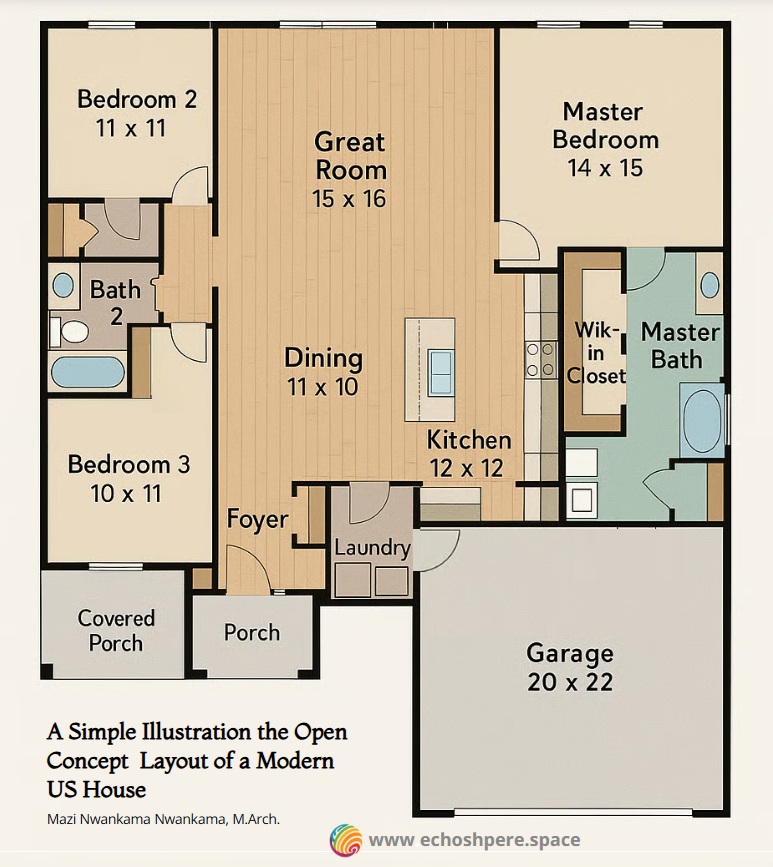Bringing America Home? Why U.S.-Based Nigerians Often Get It Wrong with House Designs Back Home!
Why do so many U.S.-based Nigerians try to replicate American house designs back home—only to regret it later? From open kitchens to hardwood floors, not all imported trends fit Nigeria's realities. In this piece, I explore the hidden clashes between aspiration and environment—and why adaptation matters more than imitation.
GENERAL TOPICSGENERAL BUSINESS TOPICSSOCIAL COMMENTARYSCIENCE & TECHNOLOGY


While discussing residential design trends with a well-accomplished Nigerian-based architect, a Fellow of the Nigerian Institute of Architects (FNIA), he raised a recurring challenge: many U.S.-based Nigerians insist on replicating American-style house features in Nigeria, despite local realities that make those features impractical or even problematic.
He explained that these “Akata” clients often resist professional advice, holding tightly to design preferences shaped by their American experience. Unfortunately, many later regret their choices when issues related to functionality, maintenance, privacy, and climate become apparent.
This growing trend reveals a tension between aspiration and appropriateness—a desire to bring the American experience home, without adapting it to Nigeria’s distinct environment and culture.
I have attempted a closer look at some of those imported design elements, why they often won’t work in Nigeria the way they work in America, and the underlying contradictions that drive their adoption.
Features Common in Modern American Homes
1. Open-Concept Layouts
In the U.S., it’s common to see modern homes where the kitchen, dining, and sitting areas are blended into one large, open space. The appeal is visual openness, easy movement, and shared family time, as well as shared time with guests.
2. Internal Kitchens and Bathrooms
Kitchens and some bathrooms are often placed completely within the building, with no access to external walls. Ventilation is handled entirely through mechanical systems, such as extractor fans or centralized Heating, Ventilation, and Air Conditioning (HVAC) systems.
3. Artificial Ventilation Is the Norm
Because homes are well-insulated and climate-controlled, there's less reliance on natural ventilation. Windows are often fixed or rarely opened.
4. Food Smell Not a Major Concern
Typical American cooking involves lighter smells—grilled meats, pastas, baked goods—which don't overwhelm a living space. In fact, many Americans don’t cook at home at all, or they rarely do so, preferring to eat in restaurants or buy already-cooked food and bring it home. In fact, many Americans already have meals delivered right to their homes. So, having the kitchen in the center of the home isn’t a problem.
5. Hardwood Floors and Drywall
Hardwood flooring and drywall are associated with modern elegance and are standard in most mid- to high-end American homes.
Why These Designs Clash with Nigerian Realities
1. Kitchen Culture and Food Smells
In Nigeria, the kitchen is traditionally a separate, private, functional space. The foods commonly prepared—soups made with dried fish and stock fish, stews, as well as smoked meats—produce strong smells and oils that cling to surfaces. Nigerians, and even those living abroad, cook more intensely than most Americans. Having an intense cooking area in an open living space can not only expose your pots of soup and stew, as well as your fridge and freezers, to easy access by visitors, but also quickly make the entire home uncomfortable with heavy cooking smells.
2. Ventilation and Power Supply
Unlike the U.S., where stable electricity powers HVAC systems 24 hours a day, 7 days a week, and 365 days a year, Nigeria deals with frequent power outages. Homes rely heavily on natural ventilation, so placing kitchens and bathrooms along external walls is crucial for maintaining airflow and controlling heat.
3. Plumbing and Maintenance Challenges
In the U.S., internal plumbing is hidden and easily maintained due to strict building codes and professional standards. In Nigeria, plumbing issues can pose immense challenges, and repairs could be more difficult when pipes are embedded inside internal walls with no external access.
4. Climate Sensitivity
Nigeria’s tropical climate—with high temperatures, humidity, and heavy rainfall—requires building designs that support airflow, feature shaded windows, and reduce heat. American-style homes with sealed interiors, wood floors, and minimal overhangs will struggle in this environment.
5. Materials Matter
Wood floors and drywall may look modern, but they are less durable in Nigerian conditions, prone to warping, termites, and water damage. Ceramic or terrazzo tiles are more practical.
Why U.S.-Based Nigerians Still Push for These Designs
I think that many U.S.-based Nigerians might insist on taking American-style houses back home for a number of reasons:
Lifestyle Imitation: After living in America, many want to replicate the comfort and luxury they experienced abroad, believing anything less is “settling.”
Status Symbolism: Open-concept spaces, granite countertops, internal bathrooms, and wood floors are perceived as markers of modernity and success.
Disregard for Local Expertise: Some returnees believe local architects are stuck in the past, rejecting advice as outdated or unsophisticated.
Emotional Sentiment: Building a “home” in Nigeria often feels symbolic, so they want it to look and feel like the life they built in the U.S.
The Smarter Solution: Adapt, Don’t Copy
As the architect shared, he doesn’t oppose modern features—he simply advocates for smart adaptation.
That could mean:
Having a buffer or closable transition zone between the kitchen and sitting areas.
Having a secondary “dirty kitchen” for heavy cooking.
Designing for natural cross-ventilation.
Placing plumbing-heavy spaces along exterior walls.
Using more climate-appropriate materials.
Combining elegance with practicality.
The truth is: what works in New Jersey or Texas won’t automatically work in Aba or Abuja. Without adaptation, modernity becomes a liability.
My Final Thought
Being abroad gives perspective, but not immunity from local realities in Nigeria. Bringing a piece of America back home shouldn’t mean ignoring what your environment, culture, and climate demand. The best homes are not just beautiful—they are livable, practical, and sustainable.



